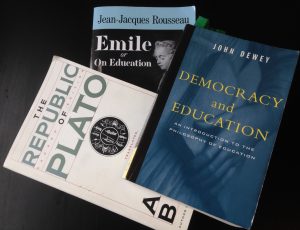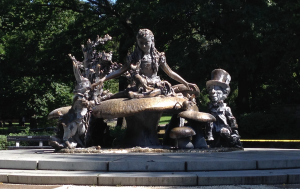23 September 2020 – Harley Richardson, a history of education enthusiast and blogger, gave the 4th Annual Education Studies Lecture at the University of Derby.
What is a ‘liberal education’?
A ‘liberal education’ was one of the crowning achievements in the history of education but one that has fallen out of fashion and is almost forgotten. This lecture will explain what a liberal education was. It will explore why it was seen as radical and what it offered to every child and young person. Liberal education helped shape social progress but is now at odds with what is called ‘progressive education’. Through understanding what a liberal education was we can make better sense of what is really progressive in education today.
25 September 2019 – Professor Michael Hand, University of Birmingham, gave the 3rd Annual Education Studies Lecture at the University of Derby
On the distinctive educational value of philosophy
Should philosophy be on the school curriculum? It certainly has general educational value: like other academic disciplines, it cultivates a range of intellectual virtues in those who study it. But this may not be a good enough reason to add it to the roster of established school subjects. The claim I will defend here is that philosophy also has distinctive educational value: there are philosophical problems that feature prominently and pressingly in ordinary human lives and that all children should be equipped by their education to tackle. Among these are the problems of justifying subscription to moral, political and religious standards. The significance of these problems for everyone is sufficient to warrant the introduction of compulsory philosophy in schools.
Wednesday 10 April 2019 – 2nd Annual Education Studies Conference 2019, Institute of Education, University of Derby.
The three greatest books on education: how relevant are they today?
 Why should we read the three greatest books on education: Plato’s The Republic; Rousseau’s Émile or On Education and John Dewey’s Democracy and Education? We should because each presents a unique portrait of an education for a particular and better society.
Why should we read the three greatest books on education: Plato’s The Republic; Rousseau’s Émile or On Education and John Dewey’s Democracy and Education? We should because each presents a unique portrait of an education for a particular and better society.
But do they tell us anything about education today? Do these books constitute the intellectual background to any informed discussion of education? What do these books tell us about the importance of ‘knowledge’, ‘democracy’ and ‘nature’ in education and the building of a better society?
Discussing the relevance of these books today will be:
Professor Dennis Hayes, Institute of Education, University of Derby who will be introducing us to Plato’s The Republic
Dr Mark Taylor, Vice-Principal, East London Science School who will discuss Jean-Jacques Rousseau’s Émile or On Education
Dr Ruth Heilbronn, University College London, Institute of Education who will talk about John Dewey’s Democracy and Education
Wednesday 19 September 2018 – Emeritus Professor Stephen Ward, University of Bath Spa, gave the 2nd Annual Education Studies Lecture at the University of Derby.
Education Studies as a University Subject: The Search for Truth
In the lecture Prof. Stephen Ward will chart the growth of Education Studies from its origins in teacher training to its current status as a stand-alone subject with its own theoretical frameworks. He will trace the effects on the discipline of the political changes which have occurred in the move from the ‘modern’ to the ‘postmodern’ university. Stephen’s argument is that Education Studies frees students from the constraints of professional practice and offers them the opportunity to engage with and to critically analyse a wide range of exciting aspects of education as the means to human betterment and change. Stephen will emphasise the importance of global perspectives and discuss the roles of the contributory disciplines: Psychology, Sociology, Philosophy, History and Economics as well as the employment opportunities for Education Studies graduates.
Wednesday 11 April 2018 – 1st Annual Education Studies Conference 2018, Institute of Education, University of Derby.
The Battle for Children’s Minds
Traditionally moral education was based upon the belief that children could become autonomous human beings with a set of virtues that enabled them to live good lives and make a positive contribution to their communities.
Today moral education is more about instilling a set of prescribed behaviours under the banner of ‘character education’. Do we no longer believe children can be autonomous human beings but need to be trained? Have we lost our belief that children can learn moral virtues? Do we even believe that children can be moral?
The 1st Annual Education Studies Conference has keynote lectures by academics and writers Dr Stephen Law, author of The War for Children’s Minds, and Dr Helene Guldberg, author of Reclaiming Childhood: Freedom and Play in an Age of Fear, who will introduce us to the contemporary battle for children’s minds and morals.
Wednesday 20 September 2017 – Dr Tony Sewell, founder and director of Generating Genius, gave the 1st Annual Education Studies Lecture at the University of Derby.
Generating Genius: It’s cool to be a ‘geek’
Science is no longer a taboo subject for the young people from disadvantaged communities who attended the Generating Genius programme. The educational charity which behind the programme works with students throughout their secondary schooling to help them acquire the skills they need to win places at top universities. But the programme does not stop there the broader aim is to get students ‘from the classroom into the boardroom’. But what is so special about the support the programme provides to young people that it succeeds where many well-established schools have failed? Does the charity have a magic wand or is it something any school could adopt and provide? Here to discuss the initiative is Dr Tony Sewell, founder and director of Generating Genius, whose vision it was, when he founded the charity, to show schools, parents and the world that under-achievement was something that we could easily do something about.
